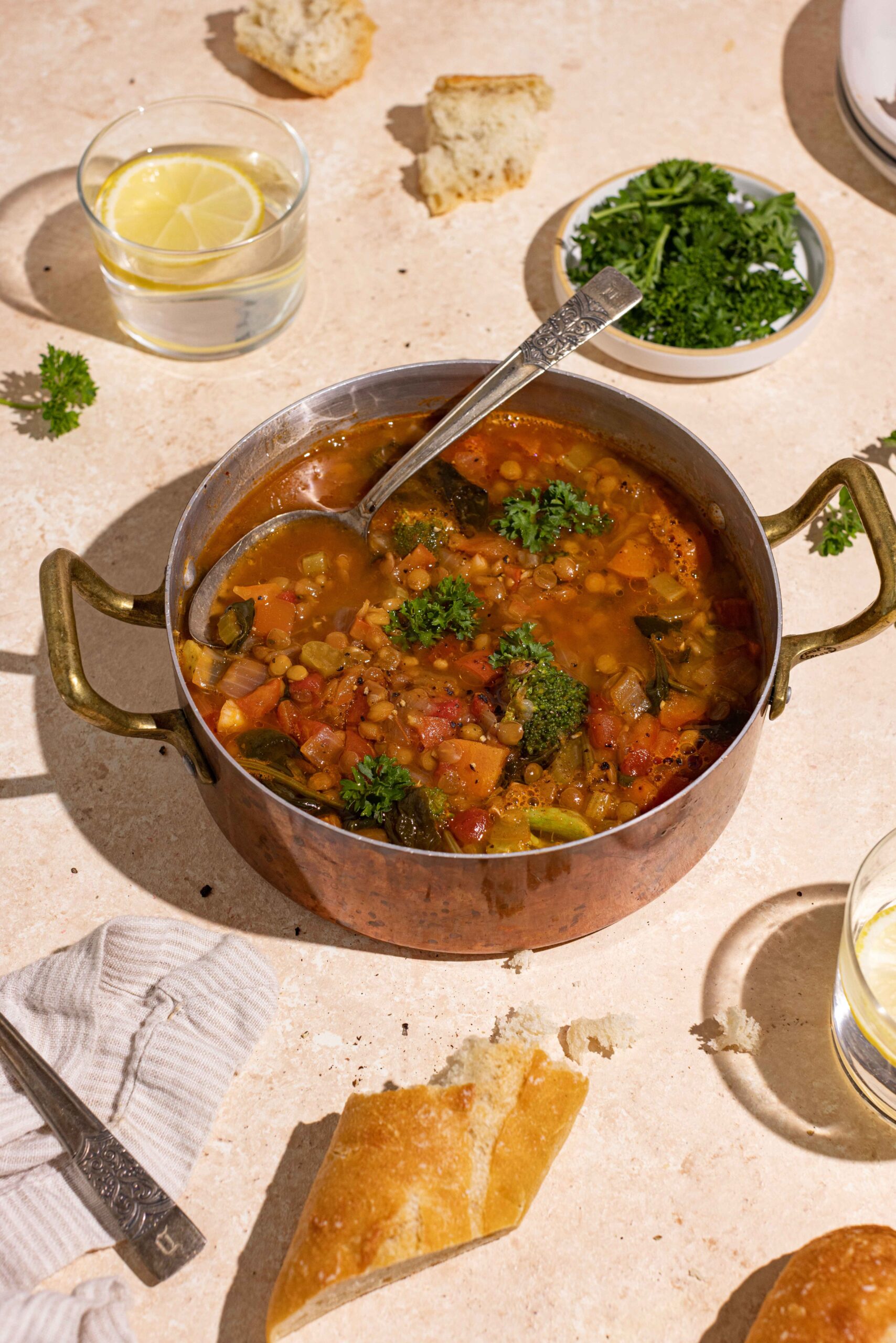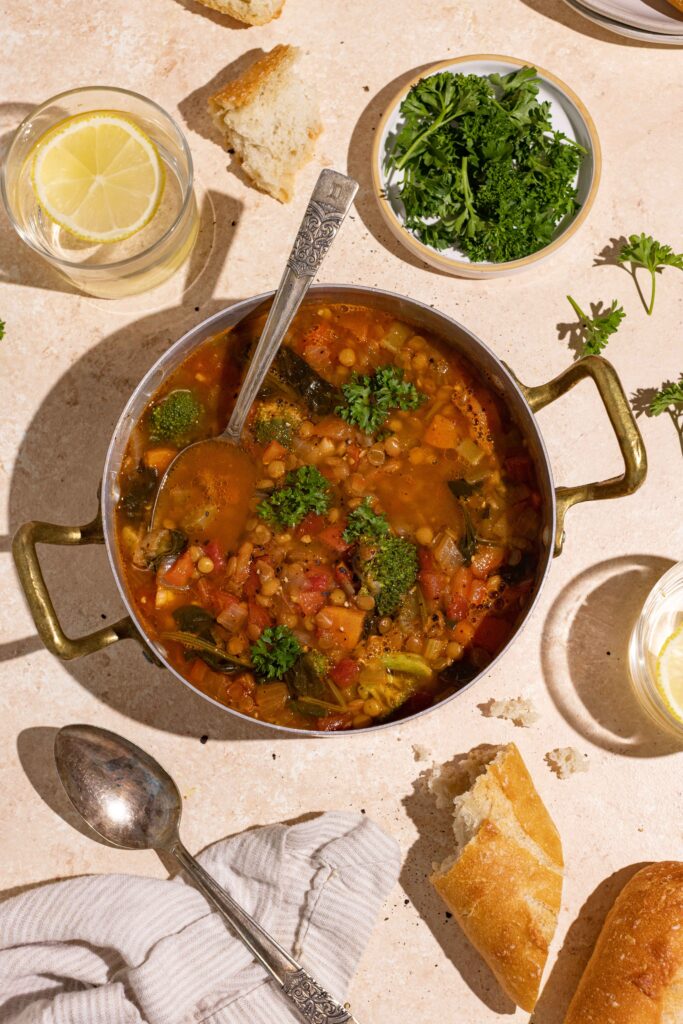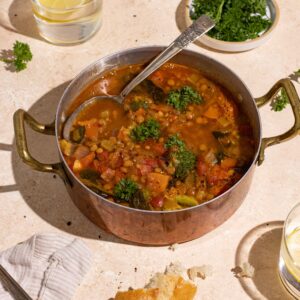
I absolutely love Mediterranean food. Known for its fresh flavors, vibrant colors, and nutrient-rich recipes, the Mediterranean region is known for its vibrant and diverse culinary traditions, which are centered around the use of fresh, whole foods and seasonal ingredients. From freshly squeezed lemon to the rich taste of extra virgin olive oil, Mediterranean cuisine is not only delicious but has also long been famous for being one of the healthiest diets. If you’re looking to combine the worlds of Mediterranean flavors with a vegetarian lifestyle, vegetarian Mediterranean meal plan, or plant-based diet, this beginner’s guide will help you build your shopping list and get started on a delicious and nutritious meal plan.
By adopting a vegetarian approach to Mediterrannean food, you can experience the best of both worlds – fresh, plant-based ingredients and the rich flavors and textures that Mediterranean cuisine is famous for.
So whether you’re a seasoned pro or a newbie in the kitchen, this guide will give you all the information you need to create a flavorful and nutritious meal plan that incorporates the principles of a vegetarian Mediterranean diet. From plant-based foods like fresh fruits and vegetables to whole grains, legumes, and healthy fats, I’ll share how to infuse your meals with rich flavors and wholesome ingredients that make Mediterranean foods so delicious and healthy. Plus, I’ll share one of my favorite vegetarian, Mediterranean-inspired easy recipes – loaded veggie lentil soup – that you and your family will love. So let’s dive in!
Build your plate with a variety of vegetables
Incorporate a colorful mix of vegetables in every meal to ensure you’re getting a wide range of key nutrients. The Mediterranean diet encourages eating a range of vegetables, making it easy to create colorful and flavorful dishes.
Opt for leafy greens, which are rich in vitamins and minerals, like:
- Spinach
- Kale
- Arugula
Roasted or grilled vegetables are a great option and add a delicious smoky flavor while providing fiber and antioxidants, such as:
- Eggplant
- Zucchini
- Bell peppers
- Artichokes
- Red Onion
Experiment with different vegetable combinations to keep your meals exciting. Choose organic and locally sourced options when possible to support your health and the environment. Consider farmers’ markets or CSA programs for fresh, seasonal vegetables.
Include plant-based protein sources
To meet your protein needs incorporate a variety of plant-based protein sources, which are also great for a vegan diet.
Enjoy legumes which are rich in fiber promoting healthy digestion and keeping you full, like:
- beans (like black beans, cannellini beans, etc.)
- lentils
- chickpeas
And other great protein options below:
- Tofu, made from soy milk, is a popular choice that absorbs flavors well and provides essential amino acids, iron, calcium, and magnesium.
- Tempeh, made from fermented soybeans, is rich in protein, fiber, and probiotics. It is a great option as a meat substitute.
- Seitan, made from wheat gluten, it is high in protein and low in fat, making it a meaty and filling option for various dishes.
Make use of whole grains
When choosing grains, opt for nutrient-dense whole grains over refined grains.
- Quinoa, a versatile “superfood,” is a complete protein and high in fiber, iron, magnesium, and B vitamins.
- Brown rice, with its chewy texture and nutty flavor, is a nutritious choice that retains its bran and germ. Whole wheat pasta provides a hearty base with more fiber and nutrients than refined pasta.
- Bulgur, a traditional Mediterranean grain, is a good source of fiber, protein, and essential minerals, and adds a light and fluffy texture to dishes.
Incorporating these whole grains into your meals will not only boost nutrition but also keep you satisfied for longer periods.
Incorporate healthy fats
The Mediterranean diet is not only famous for its emphasis on fresh produce, whole grains, and legumes but also for its inclusion of heart-healthy fats. These fats, derived mainly from olive oil, nuts, and seeds, play a crucial role in promoting overall health and well-being.
Olive oil is a staple in Mediterranean cooking and is often referred to as “liquid gold” and the easiest way to include healthy fat into your diet. It is rich in monounsaturated fats, which show to have numerous health benefits, including reducing inflammation and improving heart health. Olive oil is not only a flavorful addition to your meals but also a versatile cooking oil. Use it as your primary cooking oil for sautéing vegetables, drizzle it over salads, or use it as a dip for bread. The distinct flavor and smell of olive oil can enhance the taste of your dishes while providing you with the health benefits associated with this heart-healthy fat.
In addition to olive oil, incorporating other sources of healthy fats into your vegetarian, Mediterranean meal plan is important. Avocados are a creamy and delicious fruit that also rich with monounsaturated fats, fiber, and essential vitamins and minerals. Slice them and add to salads, mashed and spread on toast, or used as a base for creamy dressings and dips.
Nuts and seeds are also excellent sources of healthy fats and provide a great texture and crunch to your meals. Almonds, walnuts, and chia seeds are particularly rich in omega-3 fatty acids, which show to have numerous health benefits, including reducing inflammation and supporting brain health. Sprinkle a handful of nuts or seeds on top of salads, add them to your morning oatmeal or yogurt, or enjoy them as a snack on their own.
Add Mediterranean flavors
Enhance the flavors of your vegetarian, Mediterranean meals with aromatic herbs, spices, and other flavor-boosting ingredients like:
- Basil adds a fresh and herbaceous touch, while oregano brings robust flavor and health benefits.
- Thyme adds a subtle earthy taste and antimicrobial properties.
- Rosemary offers a pine-like smell and antioxidants.
- Fresh lemon juice adds tanginess and vitamin C.
- Garlic provides a pungent and savory richness.
These flavorful ingredients will elevate your dishes and add a Mediterranean flair to your meals.
Enjoy seasonal fruits
Add a touch of sweetness or burst of flavor with seasonal, Mediterranean fruits in your meals.
- Oranges are widely grown and consumed in the Mediterranean. Oranges have a refreshing taste and high vitamin C content.
- Lemons are another popular citrus fruit in the Mediterranean. Use them in various dishes, from salad dressings to marinades, and add a tangy and bright flavor.
- Grapes are a staple fruit in Mediterranean countries. You can enjoy them fresh or famously, use it to make wine. They come in different varieties and are known for their sweet and juicy taste.
- Figs are a beloved fruit in the Mediterranean, especially in countries like Greece and Turkey. They have a unique sweet and slightly nutty flavor. Enjoy them fresh or dried.
- Pomegranates are highly valued in Mediterranean cuisine for their vibrant color and sweet-tart taste. Use in salads, sauces, and desserts.
- Kalamata Olives, while technically a fruit, are a key ingredient in Mediterranean cooking. These are part of various dishes, providing a rich and savory flavor.
- Apricots are a popular stone fruit in the Mediterranean region. They have a sweet and slightly tart taste. Enjoy fresh or dried.
- Medjool dates are a type of date fruit that is commonly consumed in the Mediterranean. They are known for their rich and caramel-like flavor.
These are just a few examples of popular Mediterranean fruits. Incorporating these fruits into your meals will not only add a burst of flavor but also provide a range of nutrients and antioxidants. But don’t forget, to enjoy also enjoy what’s in season. Spring brings strawberries, cherries, and apricots, packed with nutrients. Summer offers watermelon, peaches, and berries, hydrating and rich in antioxidants. Autumn brings crisp apples and pears, high in fiber and vitamins.
Consider dairy options
While the Mediterranean diet is known for its emphasis on fresh fruits, vegetables, whole grains, legumes, and healthy fats, it also includes some dairy products. Here are a few dairy ingredients commonly used in Mediterranean cuisine:
- Greek yogurt is a staple in Mediterranean cooking. It is thick, creamy, and tangy. Enjoy on its own, use as a topping for dishes, or incorporate it into sauces and dips.
- Feta cheese is a popular cheese in Mediterranean cuisine. It is made from sheep’s milk or a combination of sheep’s and goat’s milk. Feta has a tangy and salty flavor. Crumble it over salads, include it in sandwiches, or add it to various dishes for a burst of flavor. It is also a great source of Vitamin D. Try Président Feta, which is a great kosher brand.
- Halloumi Cheese is a semi-hard cheese traditionally made from sheep’s milk in Cyprus. It has a unique texture that is firm and slightly rubbery, making it ideal for grilling or frying. Enjoy halloumi as a standalone dish or add it to salads and sandwiches.
- Yogurt, aside from Greek yogurt, is also commonly used in Mediterranean cuisine. Enjoy on its own, use it as a base for sauces and dressings, or incorporate it into baked goods and desserts.
- Pecorino Romano is a hard cheese made from sheep’s milk. It has a sharp and salty flavor. Grate over pasta dishes or use as a seasoning in various Mediterranean recipes.
These are just a few examples of dairy ingredients that are commonly used in Mediterranean cooking. However, it’s important to note that the Mediterranean diet can be adapted to suit different dietary preferences, including dairy-free options.
Stay hydrated
Staying hydrated is important for overall health on a vegetarian, Mediterranean meal plan. In addition to water, herbal teas, and infused water can provide refreshing options. Herbal teas like chamomile and peppermint offer flavor and hydration. Infusing water with lemon, cucumber, or mint adds a refreshing twist. Fruit-infused water with berries or citrus fruits adds natural sweetness and vitamins. Prioritize hydration and enjoy these flavorful and hydrating options.

Experiment with Mediterranean-inspired recipes
Now let’s pull all these together. Exploring a wide range of recipes is an exciting way to keep your meals interesting, flavorful, and satisfying.
One of the great things about vegetarian, Mediterranean cuisine is its versatility. From hearty salads and vegetable-based soups to flavorful grain bowls and homemade dips, there are endless possibilities to suit your taste preferences and dietary needs.
Salads
Salads are a fantastic way to showcase the flavors and colors of Mediterranean ingredients. Experiment with different combinations of fresh vegetables, herbs, and dressings to create a refreshing and simple salad. For example, you can toss together a Greek salad with crisp cucumbers, juicy tomatoes, tangy feta cheese, and a drizzle of olive oil and lemon juice. Or try a Mediterranean quinoa salad with roasted vegetables, chickpeas, and a zesty lemon-herb dressing. The options are truly limitless, allowing you to customize your salads to your liking. Check out this great Citrus Chicken Salad that incorporates the freshness and flavors of the Mediterranean diet and can easily be modified to be made vegetarian.
Stews & Soups
Vegetable-based stews and soups are another staple of Mediterranean cuisine. These hearty and comforting dishes are full of flavor and nutrients. For example, you can make a classic ratatouille by sautéing eggplant, zucchini, bell peppers, and tomatoes with garlic and herbs. Or try a hearty lentil and vegetable soup (see my recipe below!). These dishes are not only satisfying but also provide a great opportunity to incorporate a variety of vegetables and legumes into your meals.
Grain Bowls
Grain bowls are a popular trend in healthy eating, and they fit perfectly into a vegetarian, Mediterranean meal plan. Start with a base of whole grains like quinoa, brown rice, or bulgur, and top it with roasted or sautéed vegetables, protein-rich legumes, and dressings. For example, you can create a Mediterranean-inspired grain bowl with roasted sweet potatoes, chickpeas, cherry tomatoes, and a tangy tahini dressing. The combination of textures and flavors in grain bowls makes them a satisfying and well-rounded meal option.
Dips & Spreads
Homemade dips and spreads are a great way to add flavor and depth to your meals. Hummus, made from chickpeas, tahini, garlic, and lemon juice, is a classic Mediterranean dip that pairs well with fresh vegetables, pita bread, or as a spread in sandwiches. Tzatziki, a yogurt-based dip with cucumber, garlic, and dill, is another refreshing option that complements a variety of dishes. Experiment with different herbs, spices, and ingredients to create your own unique dips and spreads.
With the wealth of vegetarian, Mediterranean recipes available, you can truly make every meal an exciting and flavorful experience. Whether you’re a fan of salads, stews, grain bowls, or dips, there are endless combinations and variations to explore. So, dive into the world of vegetarian, Mediterranean cuisine, and let your creativity and taste buds guide you on a culinary journey filled with delicious and nutritious meals.
By following this guide to a vegetarian, Mediterranean meal plan, you’ll be able to create delicious and nutritious meals that not only taste delicious, but are great for a healthy lifestyle. Happy cooking and don’t forget to check out my Loaded Veggie Lentil Soup recipe below, that will be a perfect addition to your Mediterranean meal plan.
Loaded Veggie Lentil Soup Recipe
INGREDIENTS:
- 2 tablespoons extra virgin olive oil
- 1 large sweet onion, diced
- 2 stalks celery, diced
- 1 large carrot, diced
- 1 red bell pepper, diced
- 3 cloves garlic, minced
- 1 teaspoon paprika
- 1 teaspoon dried basil
- 1 teaspoon salt, or to taste
- 1/2 teaspoon ground black pepper, or to taste
- 2 tablespoons tomato paste
- 1 , 15 ounce can diced tomatoes
- 1 cup green lentils
- 8 cups vegetable broth
- 2 cups baby spinach
DIRECTIONS:
- Heat a large soup pot over medium-high heat and add the oil. Once heated, add the onion, celery, carrot, and bell pepper. Sauté until mostly tender, about 7 minutes.
- Add the garlic, spices, and tomato paste. Saute another 3-4 minutes.
- Stir in the canned tomatoes in their liquid, the lentils, and the broth, and bring to a low boil. Reduce the heat to low, then cover and simmer until the lentils are just tender, about 40-50 minutes.
- Stir in the spinach and simmer for another 3 minutes. Remove from heat, adjust seasoning as needed, and enjoy!

Loaded Veggie Lentil Soup
Ingredients
Ingredients:
- 2 Tbsp. extra virgin olive oil
- 1 large sweet onion diced
- 2 stalks celery diced
- 1 arge carrot diced
- 1 red bell pepper diced
- 3 cloves garlic minced
- 1 tsp. paprika
- 1 tsp. dried basil
- 1 tsp. salt or to taste
- 1/2 tsp. ground black pepper or to taste
- 2 Tbsp. tomato paste
- 1 15 oz. can diced tomatoes
- 1 cup green lentils
- 8 cups vegetable broth
- 2 cups baby spinach
Instructions
- Heat a large soup pot over medium high heat and add the oil. Once heated, add the onion, celery, carrot, and bell pepper. Sauté until mostly tender, about 7 minutes.
- Add the garlic, spices, and tomato paste. Saute another 3-4 minutes.
- Stir in the canned tomatoes in their liquid, the lentils, and broth and bring to a low boil. Reduce the heat to low, then cover and simmer until the lentils are just tender, about 40-50 minutes.
- Stir in the spinach and simmer for another 3 minutes. Remove from heat, adjust seasoning as needed and enjoy!





